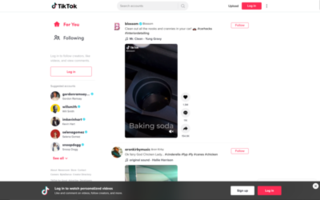Minority groups
Overview
According to technology historian Mar Hicks, creators on TikTok feel that they have to be overly cautious about what they post "because the rules change at any given moment [and] there's no transparency". [35] Hicks said that the sudden disappearance of tags, intentional or not, has "incredibly problematic effects and negative effects on communities that are already marginalized and erased". [35] The muddiness around content removal and moderation on TikTok is an ongoing frustration for the app's users. [35] TikTok has community guidelines, but there is no public list of specific words and phrases that are banned, and it is not clear how much moderation is done algorithmically versus by actual people. [35] In instances of protesting against acts of racism and racism as a whole, users have felt that there was a change in the popularity of their content, such as their content not showing up as frequently or even at all. [36]
LGBTQ+ and disabled people
In 2019, The Guardian reported that TikTok's efforts to provide locally-sensitive moderation had resulted in the removal of content that could be perceived as being positive towards LGBTQ+ people or LGBTQ+ rights (such as same-sex couples holding hands) in countries such as Turkey. [14]
In December 2019, TikTok admitted that it aimed to "reduce bullying" in the comments of videos by artificially reducing the viral potential of videos its algorithm identified as being made by LGBTQ+ people. [1] That same month, the German website Netzpolitik.org reported that TikTok also artificially reduced the viral potential of videos its algorithm identified as being made by "fat people [and] people with facial disfigurement, autism, Down syndrome, [or] disabled people or people with some facial problems". Those affected may not have their video shown outside of their native country or have it show up on the "For You" page, TikTok's personalized algorithmic homepage feed. [1] According to The Verge , some lesbians on TikTok refer to themselves jokingly as "le dolla bean", referring to the spelling of "le$bian" used to avoid TikTok removing the video. Hicks told The Verge that "it became this whole joke, because things that have the word 'lesbian' in them were either getting flagged for deletion or causing the users' accounts to get in trouble". [37]
In 2020, TikTok was accused of censoring transgender users following reports of transgender users having videos being removed or muted. The BBC reported that the LGBTQ+ charity Stonewall stated that such actions had "sent a damaging message to young trans people using the platform for support". TikTok issued a statement claiming that they "categorically do not remove any content on the basis of expression of gender identity". [38]
In September 2020, the Australian Strategic Policy Institute reported that certain LGBTQ+ hashtags has been restricted in Bosnia, Russia, and Jordan. TikTok admitted restricting hashtags in certain countries, citing local laws for some hashtag restrictions and other hashtags due to being primarily used for pornographic use. TikTok also claimed that some hashtags had been moderated by mistake and the issue subsequently fixed, and that some of the hashtags alleged to have been censored had never been used by video creators. [39]
In May 2021, American intersex activist Pidgeon Pagonis reported that the "intersex" hashtag had become unavailable on TikTok for the second time. TikTok told The Verge that the tag had been removed by mistake and was subsequently restored in both instances, which led to public speculation about whether the hashtag was censored. [35]
Black people

On May 7, 2020, in honor of the upcoming birthday of Malcolm X on May 19, TikTok user Lex Scott encouraged viewers to protest TikTok's suppression of African-American creators by changing their profile pictures to the black power fist symbol, following black creators, and unfollowing creators who did not support the initiative. This was termed the #ImBlackMovement. Thousands of TikTok users followed suit, and the hashtag #BlackVoicesHeard reached over 6 million views by the morning of May 19. [40]
After the murder of George Floyd sparked racial unrest in the United States and protests around the world on May 25, 2020, TikTok creators claimed that TikTok was deliberately suppressing videos that used the hashtags #BlackLivesMatter and #GeorgeFloyd, with these videos appearing to receive no views. TikTok released a statement apologizing for this, claiming that a technical glitch had caused the display error and that the hashtags had actually received over 2 billion views. [2] Hicks argued that LGBTQ+ people and people of color have found that the guidelines are enforced "wildly differently", meaning their content will be suppressed or removed for supposed violations and that reports of harassment from other users are not acted upon: "Not only is it hurting their ability to speak and be seen on the app, but it's also allowing them to get attacked and have hate speech thrown their way." [35]








